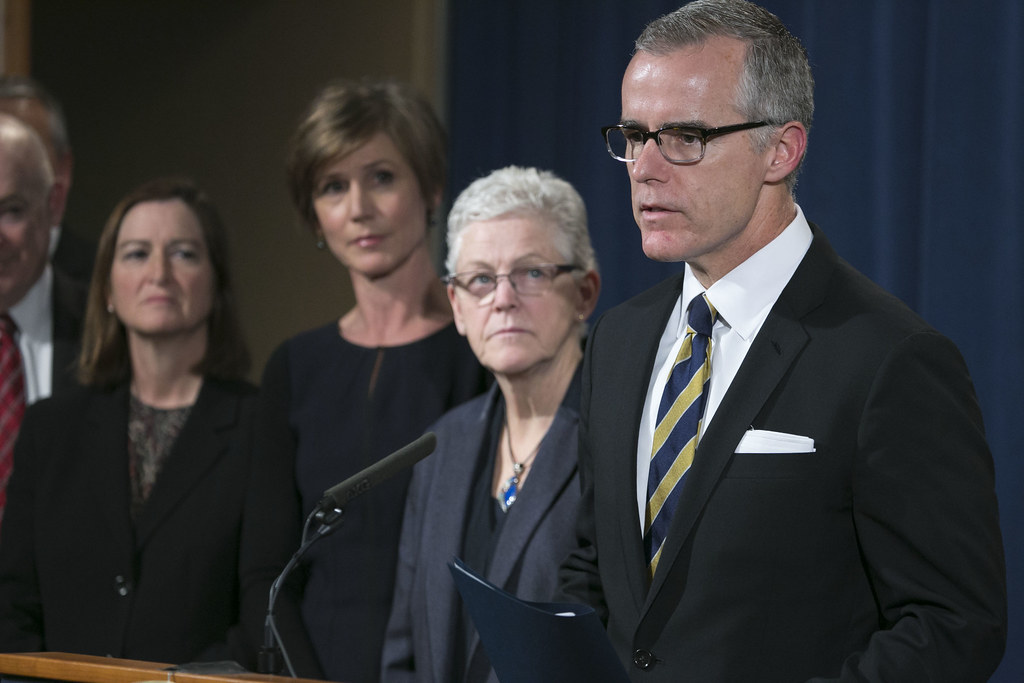Getting to the Bottom of the (Attempted) McCabe Prosecution
One of the great political mysteries of the last few weeks involves what has happened to the possible criminal indictment of former Acting FBI Director Andrew McCabe, who is accused of having made false statements regarding his role in certain leaks to the media relating to the Hillary Clinton e-mail scandal.

Published by The Lawfare Institute
in Cooperation With

One of the great political mysteries of the last few weeks involves what has happened to the possible criminal indictment of former Acting FBI Director Andrew McCabe, who is accused of having made false statements regarding his role in certain leaks to the media relating to the Hillary Clinton e-mail scandal. The Washington Post reported that the Justice Department had green-lit an indictment as early as September 12. But a subsequent grand jury hearing passed without any announcement of an indictment, leaving major questions about what happened at the hearing and whether the Justice Department will continue to try and move forward with his prosecution.
McCabe’s lawyer, Michael Bromwich, released a statement indicating that the defense team had heard the grand jury had not returned an indictment, and raising questions about whether a violation of federal rules around grand jury secrecy had taken place.
New statement from Andrew McCabe’s attorneys calls the process "deeply unfair to Mr. McCabe and his family” and "a waste of governmental resources.” They’re calling for an investigation into grand jury leaks. pic.twitter.com/aXaJwM9b1s
— Ryan J. Reilly (@ryanjreilly) September 19, 2019
Bromwich’ s statement raised serious questions, as one of us wrote at the time:
Having had similar conversations with reporters last week to the ones described here, I have little doubt that a serious 6(e) violation took place in the McCabe case. And I hope the chief judge of the district court, Judge Howell, will use her supervisory powers to look into it. https://t.co/fmnkogkMIV
— Benjamin Wittes (@benjaminwittes) September 19, 2019
Even if McCabe is never indicted, the fact that his potential prosecution has gotten this far is itself troubling. McCabe has been credibly accused of wrongdoing, but of a type that has almost never led to criminal prosecution in the past. Yet the Justice Department has moved forward with prosecution here—and it’s done so in the context of the president’s repeated and public accusations that McCabe has conspired against him and calls for him to be criminally investigated.
Any effort to use the Justice Department as a weapon against the president’s enemies would be exceptionally troubling. But it would also be consistent with an apparent willingness on the part of Trump and his administration to use the authorities of the executive branch to further the president’s political advantage from politically-motivated personnel action against FBI employees to efforts to induce foreign officials to investigate his partisan political rivals.
To know whether Trump has committed such a severe abuse of power, however, we need to have a better understanding of why the Justice Department has chosen to pursue McCabe’s prosecution. For this reason, earlier this month, we submitted two Freedom of Information Act (FOIA) requests to the Justice Department: a broader request seeking an array of documents related to McCabe’s case alongside our friends at Protect Democracy; and a narrower, more targeted request seeking a specific set of McCabe-related communications between a Trump administration appointee—then-chief of staff to the Attorney General Matthew Whitaker—and several senior career Justice Department officials that we have reason to believe may exist.
The Justice Department denied our request for expedited processing for the first request and didn’t reply in the statutorily-mandated period for the second. So last week we and Protect Democracy decided to sue to secure the responsive documents to which we’re entitled.
Below is the complaint we filed, along with exhibits containing our original FOIA requests. As always, we will keep Lawfare readers informed of any subsequent developments.






